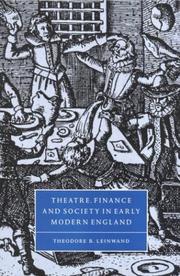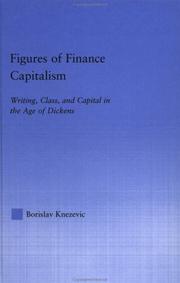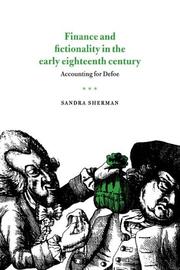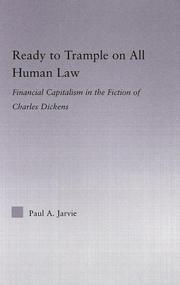| Listing 1 - 10 of 10 |
Sort by
|
Book
ISBN: 0253220270 9780253220271 9786612392481 1282392484 0253003431 9780253003430 9781282392489 6612392487 Year: 2009 Publisher: Bloomington : Indiana University Press,
Abstract | Keywords | Export | Availability | Bookmark
 Loading...
Loading...Choose an application
- Reference Manager
- EndNote
- RefWorks (Direct export to RefWorks)
Victorian Investments explores the relationship between the financial system in Great Britain and other aspects of Victorian society and culture. Building on the special journal issue of Victorian Studies devoted to Victorian investments, this volume is the first to define an interdisciplinary field of study emerging in the space between Marxist critiques of capitalism and traditional histories of business and economics. The contributors demonstrate how phenomena such as the expansion of colonial and foreign markets, the broadening of the investor base through the advent of limited liability, and the rise of financial journalism gave rise to a "culture of investment" that affected Victorian Britons at every level of society and influenced every kind of cultural production. Drawing together work by prominent historians as well as literary and cultural critics, Victorian Investments both defines the methodologies and perspectives that characterize an existing body of scholarship and pushes that scholarship in new directions, demonstrating the signal role of economic developments in Victorian culture and society.
Finance in literature. --- Finance --- Investments --- Funding --- Funds --- Economics --- Currency question --- Investing --- Investment management --- Portfolio --- Disinvestment --- Loans --- Saving and investment --- Speculation --- Social aspects --- History --- Finance in literature
Book
ISBN: 0199372896 0199372888 019937287X 1322242151 9780199372881 9780199372874 Year: 2014 Publisher: New York : Oxford University Press,
Abstract | Keywords | Export | Availability | Bookmark
 Loading...
Loading...Choose an application
- Reference Manager
- EndNote
- RefWorks (Direct export to RefWorks)
"The greed, excess, and decadence of the long 1980s has been famously chronicled, critiqued, and satirized in epochal works like White Noise by Don DeLillo, American Psycho by Bret Easton Ellis, and Tom Wolfe's The Bonfire of the Vanities. Leigh Claire La Berge offers an in-depth study of these fictions alongside the key moments of financial history that inform them, contending that throughout the 1980s, novelists, journalists, and filmmakers began to reimagine the capitalist economy as one that was newly personal, masculine, and anxiety producing. The study's first half links the linguistic to the technological by exploring the arrival of ATMs and their ubiquity in postmodern American literature. In transformative readings of novels such as White Noise and American Psycho, La Berge traces how the ATM serves as a symbol of anxious isolation and the erosion of interpersonal communication. A subsequent chapter on Ellis' novel and Jane Smiley's Good Faith explores how male protagonists in each develop unique associations between money and masculinity. The second half of the monograph features chapters that attend to works-most notably Oliver Stone's Wall Street and Wolfe's The Bonfire of the Vanities-that capture aspects of the arrogance and recklessness that led to the savings-and-loan crisis and the 1987 stock market crash. Concluding with a coda on the recent Occupy Wall Street Movement and four short stories written in its wake, Scandals and Abstraction demonstrates how economic forces continue to remain a powerful presence in today's fiction"--
American fiction --- Money in literature. --- Finance in literature. --- Capitalism and literature. --- Financial crises in literature. --- Literature and capitalism --- Literature --- History and criticism.

ISBN: 0521640318 0511003897 1107116007 0521034663 0511117191 0511149697 0511309805 0511483678 1280161914 0511051352 9780511003899 0511036124 9780511036125 9780511051357 9780511117190 9780521640312 9780511483677 9780521034661 Year: 1999 Volume: 31 Publisher: Cambridge Cambridge University Press
Abstract | Keywords | Export | Availability | Bookmark
 Loading...
Loading...Choose an application
- Reference Manager
- EndNote
- RefWorks (Direct export to RefWorks)
This interesting study examines emotional responses to socio-economic pressures in early modern England, as they are revealed in plays, historical narratives and biographical accounts of the period. These texts yield fascinating insights into the various, often unpredictable, ways in which people coped with the exigencies of credit, debt, mortgaging and capital ventures. Plays discussed include Shakespeare's The Merchant of Venice and Timon of Athens, Jonson's The Alchemist and Massinger's A New Way to Pay Old Debts. They are paired with writings by and about the finances of the corrupt Earl of Suffolk, the privateer Walter Raleigh, the royal agent Thomas Gresham, theatre entrepreneur James Burbage, and the Lord Treasurer Lionel Cranfield. Leinwand's new readings of these texts reveal a blend of affect and cognition concerning finance that includes nostalgia, anger, contempt, embarrassment, tenacity, bravado and humility.
Arts and Humanities --- Literature --- English drama --- Economics in literature. --- Literature and society --- Finance --- Finance in literature. --- History and criticism. --- History --- Funding --- Funds --- Economics --- Currency question
Book
ISBN: 081394290X 9780813942902 9780813942896 Year: 2019 Publisher: Charlottesville: Baltimore, Md. : University of Virginia Press, Project MUSE,
Abstract | Keywords | Export | Availability | Bookmark
 Loading...
Loading...Choose an application
- Reference Manager
- EndNote
- RefWorks (Direct export to RefWorks)
Book
ISBN: 9780823279173 0823279170 9780823279166 0823279162 0823279197 0823281434 Year: 2018 Publisher: New York, NY : Fordham University Press,
Abstract | Keywords | Export | Availability | Bookmark
 Loading...
Loading...Choose an application
- Reference Manager
- EndNote
- RefWorks (Direct export to RefWorks)
Finance Fictions takes the measure of what it means to live in a world ruled by high finance by examining the tension between psychosis and realism that plays out in the contemporary finance novel. When the things traded at the center of the economy cease to be things at all, but highly abstracted speculations, how do we come to see the real? What sorts of narrative can accurately approach the actual workings of a neoliberal economy marked by accelerating cycles of market crashes, economic and political crisis, and austerity? Revisiting such twentieth-century classics of the genre as Tom Wolfe's Bonfire of the Vanities and Bret Easton Ellis’s American Psycho, De Boever argues that the twenty-first century is witnessing the birth of a new kind of realistic novel that can make sense of complex financial instruments like collateralized debt obligations, credit default swaps, and digital algorithms operating at speeds faster than what human beings or computers can record. If in 1989 Wolfe could still urge novelists to work harder to “tame the billion-footed beast of reality,” today’s economic reality confronts us with a difference that is qualitative rather than quantitative: a new financial ontology requiring new modes of thinking and writing. Mobilizing the philosophical thought of Quentin Meillassoux in the close reading of finance novels by Robert Harris, Michel Houellebecq, Ben Lerner and less well-known works of conceptual writing such as Mathew Timmons’ Credit, Finance Fictions argues that realism is in for a speculative update if it wants to take on the contemporary economy—an “if” whose implications turn out to be deeply political. Part literary study and part philosophical inquiry, Finance Fictions seeks to contribute to a new mindset for creative and critical work on finance in the twenty-first century.
Money in literature --- Finance in literature --- Financial crises in literature --- American fiction --- History and criticism --- American fiction. --- Finance in literature. --- Financial crises in literature. --- Money in literature. --- 1900-1999. --- History and criticism. --- Biopolitics. --- Finance Novels. --- Finance. --- Marxism. --- Neoliberalism. --- Popular fiction. --- Psychosis. --- Realism. --- Speculative Realism. --- Wall Street.
Book
ISBN: 1421420619 9781421420615 9781421420608 1421420600 1421441101 9781421441108 Year: 2016 Publisher: Johns Hopkins University Press
Abstract | Keywords | Export | Availability | Bookmark
 Loading...
Loading...Choose an application
- Reference Manager
- EndNote
- RefWorks (Direct export to RefWorks)
Americans pay famously close attention to ""the market,"" obsessively watching trends, patterns, and swings and looking for clues in every fluctuation. In Reading the Market, Peter Knight explores the Gilded Age origins and development of this peculiar interest. He tracks the historic shift in market operations from local to national while examining how present-day ideas about the nature of markets are tied to past genres of financial representation.
Drawing on the late nineteenth-century explosion of art, literature, and media, which sought to dramatize the workings of the st
Finance in art. --- Finance in literature. --- Capitalism and literature --- Journalism, Commercial --- Finance --- Literature and capitalism --- Literature --- Business journalism --- Commercial journalism --- Economic journalism --- Financial journalism --- Financial news --- Journalism --- Journalism, Economic --- Trade journalism --- Funding --- Funds --- Economics --- Currency question --- History. --- History --- Commerce --- Finance in literature --- Finance in art --- E-books --- History of the Americas

ISBN: 1138868639 1135947120 1280075945 0203485130 9780203485132 9786610075942 6610075948 9780415943185 0415943183 0415943183 9781135947071 9781135947118 9781135947125 9781138868632 0203603478 1135947112 Year: 2003 Publisher: New York : Routledge,
Abstract | Keywords | Export | Availability | Bookmark
 Loading...
Loading...Choose an application
- Reference Manager
- EndNote
- RefWorks (Direct export to RefWorks)
Figures of Finance Capitalism brings into focus Victorian narratives by major middle-class writers in which the workings of finance capitalism are prominently featured, and reads this interest in finance capitalism in the context of middle-class misgivings about a class system still dominated by a patrician elite. This book illustrates the centrality of finance capitalism to the mid-Victorian middle-class social imagination by discussing a selection of major Victorian texts by Dickens, Gaskell, Thackeray and Macaulay. In so doing, it draws on several new perspectives on British histor
English fiction --- Capitalism and literature --- Capitalists and financiers in literature. --- Social classes in literature. --- Capitalism in literature. --- Finance in literature. --- Literature and capitalism --- Literature --- History and criticism. --- History --- Macaulay, Thomas Babington Macaulay, --- Macaulay, --- Macaulay, T. Babington --- Makoleĭ, Tomas-Babington, --- Makolej, T. B., --- מקוליי, תומס בבינגטון,
Book
ISBN: 0823280381 0823254992 0823261123 082325500X 0823254984 0823254976 1322964912 9780823254989 9780823254996 9780823255009 9780823261123 9780823254972 9780823280384 Year: 2014 Publisher: New York : Fordham University Press,
Abstract | Keywords | Export | Availability | Bookmark
 Loading...
Loading...Choose an application
- Reference Manager
- EndNote
- RefWorks (Direct export to RefWorks)
During a tumultuous period when financial speculation began rapidly to outpace industrial production and consumption, Victorian financial journalists commonly explained the instability of finance by criticizing its inherent artifice—drawing persistent attention to what they called “fictitious capital.” In a shift that naturalized this artifice, this critique of fictitious capital virtually disappeared by the 1860's, replaced by notions of fickle investor psychology and mental equilibrium encapsulated in the fascinating metaphor of “psychic economy. ”In close rhetorical readings of financial journalism, political economy, and the works of Dickens, Eliot, and Trollope, Kornbluh examines the psychological framing of economics, one of the nineteenth century’s most enduring legacies, reminding us that the current dominant paradigm for understanding financial crisis has a history of its own. She shows how novels illuminate this displacement and ironize ideological metaphors linking psychology and economics, thus demonstrating literature’s unique facility for evaluating ideas in process. Inheritors of this novelistic project, Marx and Freud each advance a critique of psychic economy that refuses to naturalize capitalism.
Economics and literature --- Economics --- Finance in literature. --- English literature --- Economic theory --- Political economy --- Social sciences --- Economic man --- Literature --- Literature and economics --- History --- Psychological aspects --- History and criticism. --- Economic aspects --- Marx. --- Marxism. --- Psychic Economy. --- Psychoanalysis. --- crisis. --- economics. --- finance. --- freud. --- novel. --- realism. --- theory. --- victorian.

ISBN: 0511582218 0511001002 0521021421 0521481546 Year: 1996 Publisher: Cambridge : Cambridge University Press,
Abstract | Keywords | Export | Availability | Bookmark
 Loading...
Loading...Choose an application
- Reference Manager
- EndNote
- RefWorks (Direct export to RefWorks)
In the early eighteenth century, the increasing dependence of society on financial credit provoked widespread anxiety. The texts of credit - stock certificates, IOUs, bills of exchange - were denominated as potential 'fictions', while the potential fictionality of other texts was measured in terms of the 'credit' they deserved. Sandra Sherman argues that in this environment finance is like fiction, employing the same tropes. She goes on to show how the work of Daniel Defoe epitomised the market's capacity to unsettle discourse, demanding and evading 'honesty' at the same time. Defoe's œuvre, straddling both finance and literature, theorizes the disturbance of market discourse, elaborating strategies by which an author can remain in the market, perpetrating fiction while avoiding responsibility for doing so.
Economics --- Finance --- Economics in literature. --- Finance in literature. --- Fiction --- Fiction writing --- Metafiction --- Writing, Fiction --- Authorship --- Funding --- Funds --- Currency question --- Economic theory --- Political economy --- Social sciences --- Economic man --- History --- Technique. --- Defoe, Daniel, --- Defoe, Daniel --- Fefoe, Daniel --- De Fo, Daniel' --- De Foe, Daniel --- Defo, Daniel --- Defo, Danielo --- Defo, Daniyel --- English gentleman --- Gabriel John --- Gentleman --- John, Gabriel --- L. M. --- Lay-hand in the country --- Lover of old England --- Lover of truth --- Merchant --- Moreton, Andrew --- Даниель Дефо --- דעפא, דאניעל --- דפו, דניאל --- דפו, דניאל, --- דיפו, דניאל --- דיפו, דניאל, --- דיפואה, --- Johnson, Charle, --- Knowledge --- Economics. --- Economics in literature --- Finance in literature --- Arts and Humanities --- Literature --- Defoe, Daniel, - 1661?-1731 - Knowledge - Economics. --- Economics - England - History - 18th century. --- Finance - England - History - 18th century. --- Knowledge and learning.

ISBN: 1135488444 0203959175 9781135488512 1135488517 9780203959176 0415975247 9780415975247 9781135488444 9781135488581 9780415869461 0415869463 Year: 2005 Publisher: New York : Routledge,
Abstract | Keywords | Export | Availability | Bookmark
 Loading...
Loading...Choose an application
- Reference Manager
- EndNote
- RefWorks (Direct export to RefWorks)
This book explores the relationship between Dickens's novels and the financial system. Elements of Dickens's work form a critique of financial capitalism. This critique is rooted in the difference between use-value and exchange-value, and in the difference between productive circulations and mere accumulation. In a money-based society, exchange-value and accumulation dominate to the point where they infect even the most important and sacred relationships between parts of society and individuals. This study explores Dickens's critique from two very different points of view. The first
Capitalism and literature --- Capitalists and financiers in literature. --- Economics in literature. --- Finance in literature. --- Literature and capitalism --- Literature --- History --- Dickens, Charles, --- Dickens, Charles --- Dikensi, Čʻarlz, --- Dickens, Karol, --- Dikens, Charlz, --- Ti-keng-ssu, --- Digengsi, --- Dikkens, Charlz, --- Dikensas, Čarlzas, --- Ṭikkan̲s, Cārls, --- Ṭikkan̲cu, Cārlacu, --- Ṭikkan̲s, Cārlas, --- Диккенс, Чарлз, --- דיקינס, צ׳רלס, --- דיקנס, ַ צ׳רלז --- דיקנס, טשרלס --- דיקנס, צ׳רלז, --- דיקנס, צ׳רלס --- דיקנס, צ׳רלס, --- דיקענס, טש --- דיקענס, טשארלז --- דיקענס, טשארלז, --- דיקענס, טש., --- דיקקענס, טשארלז --- טשרלס, דיקנס --- チャールズ.ディケンズ, --- 狄更斯查尔斯, --- Boz, --- Sparks, Timothy, --- Knowledge --- Economics. --- Characters --- Capitalists and financiers.
| Listing 1 - 10 of 10 |
Sort by
|

 Search
Search Feedback
Feedback About UniCat
About UniCat  Help
Help News
News